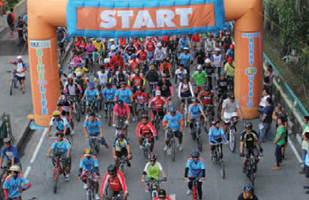
Bayanihan sa Daan Sustainable Transport
Pasig City
2017
Pursuant to its vision of becoming a “Green City”, Pasig City launched a sustainable urban transport strategy that promotes pedestrian-friendly infrastructures, traffic decongestion schemes, and alternative non-motorized transportation. It is managed by eight active technical working groups, and the Pasig Adhoc Transport Planning Committee that ensure regular consultations among stakeholders.
The city government uses the “Sandwich Approach” or “Bibingka” Paradigm to accomplish its tasks wherein brainstorming from bottom up and top to bottom involves the entire community. Starting with a vision coming from either the city leadership or any of the stakeholders, solutions are formed via consultations and are translated into a local law or ordinance. Stakeholders are also members of the technical working group and likewise implementers. A regular feedback mechanism was also institutionalized by Pasig City to ensure sustainability and active people’s participation.
Under the program, Environmentally Sustainable Transport (EST) was introduced in opening a free Pasig community shuttle service bus to the public as well as replacing and upgrading of old two stroke tricycles to electronic tricycles (e-trikes). Around 135,538 daily commuters benefit from the free bus service within Pasig City while 50 e-trike beneficiaries saw a 50 percent increase in their income, incentivized through a corollary ordinance (Ordinance No. 16 Series of 2016) that established a Tricycle Upgrading and Replacement Program.
The city also encouraged alternative modes of transportation such as riding bicycles. A 15-kilometer bike lane was installed and 660 bike parking facilities were set up in various buildings and establishments around the city. Incentives in the form of real property discounts are also given to new and existing commercial, industrial and business establishments installing bike racks and cycling facilities, providing company bus shuttle service, and other forms of non-motorized transportation such as well-connected and integrated sidewalks. Additionally, penalties were given to establishments for narrow/non-existent sidewalks and parking queues that encroach on the city/national roads. Related initiatives to support this goal have also been started in 2013 when Pasig City in partnership with the Asian Development Bank, launched a “Tutubi” bike sharing system, the first of its kind in the Philippines. Funded by the Japanese Fund for Poverty Reduction (JFPR) and managed by Clean Air Asia, it features a terminal which resembles an ATM and 10 bicycles with docks that secure them when they are not in use. The station is located at the Pasig City Hall and the bikes are only accessed by a card system available initially to city hall employees. (http://cleanairasia.org/node12100 visited in 21
November 2017.)
Special events such as Carless Sundays and Bike for Life are implemented and sustained through an ordinance (Ordinance No. 13 Series of 2011) that promotes biking as a healthful and environmentally-sound mode of transportation in five major roads for the last five years, actively participated by 185,000 visitors/carless loyalists and 2,500 bikers/bike enthusiasts. In its walkability and pedestrianization promotion, 25 elevated skywalks and walkways are built city-wide while a 3-kilometer elevated skywalk connects the City Hall and other surrounding buildings, ensuring the safety and convenience of pedestrians. Furthermore, these initiatives led to the reduction of fuel consumption and carbon dioxide emission; 72% air quality improvement; and promotion of healthy lifestyle, and non-motorized transport to the general public.
Serving as a gateway to surrounding provinces and cities, Pasig City implemented the Odd-Even Traffic Vehicle Volume Reduction Scheme in 2016, within the six major boundaries of the city. As a traffic road diet scheme, vehicles with license plate numbers ending in 1, 3, 5, 7 and 9 cannot use specific roads on Tuesdays, Thursdays and Saturdays while vehicles with license plate numbers ending in 0, 2, 4, 6 and 8 may not pass on the identified roads on Mondays, Wednesdays and Fridays. Notably, it reduced travel time from 1 hour and 30 minutes to 45 minutes and vehicle traffic volume down by 26%.
An Intelligent Traffic System (ITS) was also installed including 82 Road Safety Blinking Solar Pedestrian Lights as well as six LED Monitoring Advisory in strategic areas in Pasig City to lessen the risk of traffic accidents/deaths, and ensure safer roads for motorists and pedestrians. It receives real-time data from various sensors like VDS-CCTV, inductive loop, and RSE installed all over the city where it would be able to send information to commuters through smart phone applications and the worldwide web.
With all these programs, Pasig City is a recipient of several awards such as the Bayanihan sa Daan Awards for 2014 and 2015, the ASEAN Model Cities Award as an Environmentally Sustainable City, and the International Liveable Community Awards for the Share the Road Program. Cities in Metro Manila and neighboring provinces including Malabon, Makati, Muntinlupa and San Mateo, Rizal already adopted the Share the Road Project of Pasig City and other sustainable transport initiatives. The Metropolitan Manila Development Authority also adopted the Carless Sunday Program through a Metro Manila Mayors Council Resolution including the program as a family zone.
Truly, Pasig City has lived up to its vision as a “Green City”.


